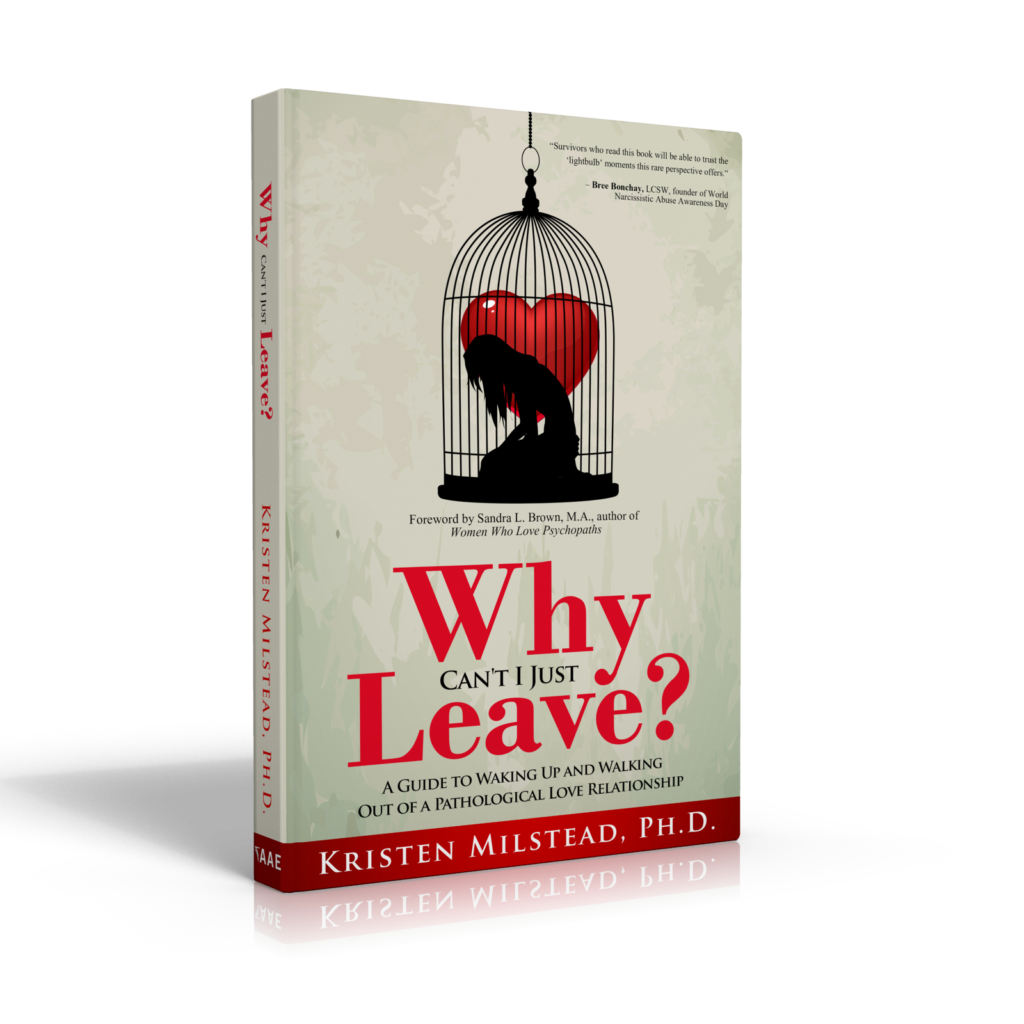Did you ever wonder why the wolf in Little Red Riding Hood didn’t just kill the little girl when he found her in the first place? I mean, he’s a wolf. He can outrun her. And he has teeth. Why run ahead to grandmother’s house and play dress-up?
The story of the wolf in sheep’s clothing is a story of a hidden predator. The predator walks among the sheep undetected because gaining the trust of the sheep first before attacking gets the wolf more for less effort.
Have you found yourself in more than one narcissistic relationship?
I bet you’ve been blamed for it, or told if you only healed certain aspects of yourself it would stop happening.
There are two people in a narcissistic relationship, however, and it’s important to take a good look at both.
![]()

Why You Keep Getting into a Narcissistic Relationship
Below are some factors that might play a role in why you end up being re-victimized by narcissists that result from your own circumstances or what you bring to the table. Please note that none of these things mean that it is your fault that you have been victimized or re-victimized.
Taking a closer look at these factors, however, can help to explain why narcissists are able to manipulate us.
1. A Period of Transition
Going through a major life transition is one of the primary factors that can make one vulnerable to a relationship with a predator (or to any type of exploitation). This can include being a new transplant to a city or a recent divorce. Being in one abusive relationship can be such an upheaval that it can create a situation for another predator to come in.
2. Empathic Personality
If you are an empath or an empathetic person by nature, you may have a desire to take care of or help the narcissist. This is separate and distinct from “codependency.”
You simply may be a person who finds it easy to take on the perspective of others. It may come naturally to you, and you find it easy to empathize with the stories or excuses the narcissist gives because you are a genuine person. In fact, it may be completely unnatural to assume that when people tell you about their hardships or that when they ask for another chance after making a mistake, that they are doing so for ulterior motives.
Or that no matter what you do or how many times you are forgiving or understanding, things will not change. It feels morally wrong not to assist or give them a chance when we are wired to believe that they are in the relationships for the same reasons we are.
If the narcissist who has kept his or her true nature hidden, and your nature is to be a caretaker, you have not entered the relationship with the narcissist of your own free will expecting for that trait to be taken advantage of.
3. Repetition Compulsion
If you were raised by a narcissist or had an abusive childhood, entering relationships with exploitative people may feel familiar. This is called “repetition compulsion.” Healthy relationships may feel foreign until you learn what it is that you are seeking in these relationships and how the narcissist is using those qualities to exploit you.
It’s important to understand that this doesn’t mean that you are responsible for your own suffering; we are not responsible for what has happened to us in our own childhoods. It means that the narcissist has learned how to fill a need that has been placed there in you by circumstances that aren’t your fault.
4. False Beliefs About Healing
Whether you had been groomed for narcissistic relationships by your childhood or not, a relationship with a narcissist leaves you with trauma that you will need to heal.
If you do the difficult work to move past any of your trauma, past or present, this can result in the belief that once the initial pain of a breakup with a narcissist has ended, you are fully recovered and ready to move forward.
This can be dangerous.
Furthermore, believing that you only need to “work on yourself” without having a complete understanding and acceptance of the red flags of narcissism can set you up for a false sense of security that you are now neither attractive to a narcissist nor would you fall for that again.
This is why it’s so important to consider what it is narcissists do to manipulate us.

The Role of the Narcissist
We’re often encouraged to point the fingers at ourselves when it comes to understanding why multiple victimizations have occurred.
Why is it important to consider the narcissist too?
By understanding what narcissists are looking for and how they entice partners into relationships, we arm ourselves in ways that we cannot do by only examining ourselves.
Without that perspective, we open ourselves up to leaving the analysis of what narcissists see in us incomplete. We also may fail to recognize how a narcissist may draw us in again until it’s too late if we are too focused on ourselves.
Focusing on the narcissist too can be empowering, as it can help us to realize that it is the interaction between us and the narcissist and not something about us alone that is why we find ourselves in multiple narcissistic relationships.
Steven Stosny (2008), psychologist and author of Love Without Hurt, says that people who have been in many abusive relationships have put up walls to protect themselves from being hurt.
“Non-abusive men will recognize and respect those barriers. For example, suppose that you work with someone who’s attracted to you. But he senses that you’re uncomfortable with his small gestures for more closeness. He will naturally back off and give you time to heal, or he’ll settle for a non-romantic friendship. But a man who is likely to mistreat you will either not recognize your barriers or completely disregard them. He will continue to hit on you, until he breaks down the protective walls that surround your hungry heart.”
Understanding how narcissists slide under the radar by grooming us to let them past our barriers so they can abuse us is crucial in order to recognize how they are responsible for the abuse.

How Partners Are Groomed in a Narcissistic Relationship
There is a pattern to how narcissists groom their partners. This pattern is a familiar one with steps that can be found in many other situations, such as cult abuse (Hassan, 2018; Haworth, n.d.; Singer, n.d.), sex trafficking (Long 2014), and others (Stein, n.d.).
1. Find a target.
Narcissists look for a target who has one or more of the above characteristics. Again, one of the most important may be to find someone who is currently experiencing a lot of transition in life, because there may be values gaps or an openness to new experience.
Narcissists are also likely to select someone who has something to offer them beyond the traits above. The traits above are merely how the narcissist manipulates us into relationships, but the narcissist must also see something to gain. The possibilities usually range from making them look good in some way to elevate their own status and feed into the beliefs they have that they are special to more tangible things, such as sex, money, access to something they desire.
Yet beyond the attractiveness of a target, there must be a “way in,” or something that the narcissist perceives as a vulnerability. For example, the narcissist may be able to play on the victim’s sympathy or the victim may have just moved and may not have many friends.
There is nothing special that makes victims defective, however. Almost everyone has a vulnerability that can be exploited if the narcissist finds the target to be valuable.
2. Gain your trust.
Narcissists use this stage to mirror you and make you feel as if the two of you have a lot in common. They will seem very concerned for your well-being and this is generally when you will experience love-bombing. The goal is to get you to drop your guard and make yourself vulnerable in the first place.
This is why anyone can be manipulated. The first hit is breaking down your barriers so they can get to know you in the first place.
3. Gather information.
Once you have begun trusting the narcissist, he or she will learn as much as possible about you in order to use it to his or her advantage. The information may be used to make you feel even closer, but primarily, it will be used to learn what it is you need so the narcissist can provide or become that and exploit those vulnerabilities.
4. Fill a need you have.
Everyone has something they want and narcissists will figure out what so they can use it to manipulate you. Here is where we believe we may believe we have found our soulmate. The narcissist seems perfect. They are the dream man or woman, giving you the thing you’ve never had.
5. Isolate you from others.
The narcissist will want to distance you from others in your life, from friends and family who may see red flags in the narcissist or the relationship. He or she will start to dominate your time so that you have no time left to spend with anyone else.
In addition, the more isolated you become, the more dependent you become on the narcissist and the easier you are to control.
6. Test your loyalty.
The narcissist may begin to ask you to give up things you enjoy or to choose him or her over something that you care about. He or she may ask you to do things or change things, small things at first, as a way to show how much you love him or her. Over time, the requests will increase in frequency or in degree.
This is how our identities begin to shift to take to be more accommodating to the narcissist’s needs and less in touch with our own.
7. Withdraw the stimulus.
That thing that the narcissist has been supplying for you? Whatever it was that you thought came so naturally, the desire that you always had that the narcissist was fulfilling, will now be dangled over you if you don’t comply with what the narcissist wants.
The narcissist may begin to find fault and claim that you aren’t fulfilling your end of the relationship. It may be in response to a denial of one of the tests of loyalty, or it may be simply that you’ve become so compliant that the narcissist is getting bored.
8. Erode your boundaries.
The narcissist uses a variety of confusing tactics to confuse you into believing it’s your fault and if you try harder, things will go back to the way they used to be. Slowly, you begin to change how you interact with the narcissist. Over time, you will give up more and more to get less and less.
9. Repeat until a trauma bond is formed.
The narcissist alternates between love bombing and cruelty until you have developed a form of Stockholm Syndrome, called a trauma bond. You defend the narcissist to others and hide his or her behavior, feeling strangely loyal to him or her and unable to escape, structing your entire life around the relationship and holding out for the days when he or she treats you with kindness again.
Escaping Narcissistic Relationships
When we interact with people, we are conditioned and hard-wired to give them the benefit of the doubt. Narcissists who blend in with others when we meet them won’t ring alarm bells unless we are ready to accept that narcissists are the other actors in these relationships and take a hard look at how they manipulate us.
Even if we’ve been in a narcissistic relationship before, if we aren’t aware of this pattern, it remains hidden every time we encounter it. Then, just as it was the first time, no matter how well we have recovered, it won’t become apparent until it’s too late.
So take the time to heal your wounds and discover what it is that narcissists are exploiting. But do not neglect to learn this pattern of how narcissists draw partners into abusive relationships.
And do not take the blame for something that is most definitely not your fault.
Want more? Get more articles like this one delivered straight to your inbox.
Don’t forget to check out these free resources:
- Taking Your Life Back After a Relationship With a Narcissist – Recovery Toolkit
- Comprehensive Narcissistic Abuse Dictionary
- The Best Resources for Narcissistic Abuse Recovery
Sources
Haworth, I. (n.d.). Cult Information Centre: Caring for Cult Victims. Retrieved January 27, 2019, from https://cultinformation.org.uk/article_caring-for-cult-victims.html
Long, Mariah. 2014. “Basic Stages of Grooming for Sexual Expoitation.” End Slavery Now. Accessed on August 4, 2019 at https://www.endslaverynow.org/blog/articles/basic-stages-of-grooming-for-sexual-exploitation
Singer, M. T. (n.d.). Post-Cult After Effects. Retrieved January 27, 2019, from https://www.icsahome.com/articles/post-cult-after-effects-singer
Stein, A. (n.d.). Cult/Totalist Recruitment Warning Signs. Retrieved January 27, 2019, from http://www.alexandrastein.com/warning-signs.html
Stosny, Steven. 2008. “Are You Dating an Abuser?” Psychology Today. Accessed on August 4, 2019 at https://www.psychologytoday.com/us/blog/anger-in-the-age-entitlement/200812/are-you-dating-abuser






3 Comments
Harry*
This is a particularly good article, Kristen; one that gave me pause for reflection. I’ve been recovering from a long-term relationship with a narcissist for over two and a half years. Early this summer, I began to believe I might be ready for a new romantic relationship.
I moved slowly, but before long, I began to recognize a familiar pattern–the same pattern eloquently captured in the nine points above. I also realized the pattern has been present in practically every relationship I’ve ever had. I immediately hit the brakes, and I’m happy I did. The most important thing I’ve learned is that *I* have played an integral role in the development and operation of the narcissistic manipulationship. Without my willing, yet unwitting, participation, it could never have taken root. I feel a bit wiser now, and I regularly give considerable thought to how I conduct myself in *all* of my relationships, paying special attention to certain red flags. Prominent among the early indicators is the sense that the other person seems to be “pushing” a bit too hard, trying to monopolize your time, climb your walls, and occupy the tower too quickly. Steps 1 through 5 above describe the process perfectly.
Matthew Gerome
Very good article ! Much,appreciated.
I was in need of some validation.
I particularly found the Stosny article reassuring and sound advice.
Thanks for the reference.
Kristen Milstead
Hi Matthew: Thank you, and I’m so glad that you found this article helpful. I too enjoyed Stosny’s article. It was truly a game-changer for me in terms of helping me to gain a new perspective on abusive relationships. I’m happy to know that it was meaningful to you as well. Stay strong and take care of yourself! -Kristen